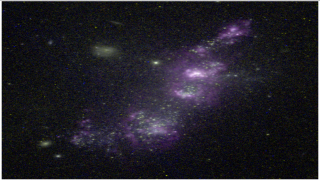Bibcode
Elmegreen, B. G.; Herrera, Cinthya; Rubio, Monica; Elmegreen, Debra Meloy; Sánchez Almeida, J.; Muñoz-Tuñón, C.; Olmo-García, A.
Bibliographical reference
The Astrophysical Journal Letters, Volume 859, Issue 2, article id. L22, 6 pp. (2018).
Advertised on:
6
2018
Citations
7
Refereed citations
6
Description
A giant star-forming region in a metal-poor dwarf galaxy has been
observed in optical lines with the 10 m Gran Telescopio Canarias (GTC)
and in the emission line of CO(1–0) with the Northern Extended
Millimeter Array (NOEMA) mm-wave interferometer. The metallicity was
determined to be 12+{log}({{O}}/{{H}})=7.83+/- 0.09, from which we
estimate a conversion factor of α CO ∼ 100 M
⊙ pc‑2(K km
s‑1)‑1 and a molecular cloud mass of
∼2.9 × 107 M ⊙. This is an enormous
concentration of molecular mass at one end of a small galaxy, suggesting
a recent accretion. The molecular cloud properties seem normal: the
surface density, 120 M ⊙ pc‑2, is
comparable to that of a standard giant molecular cloud; the
cloud’s virial ratio of ∼1.8 is in the star formation range;
and the gas consumption time, 0.5 Gyr, at the present star formation
rate is typical for molecular regions. The low metallicity implies that
the cloud has an average visual extinction of only 0.8 mag, which is
close to the threshold for molecule formation. With such an extinction
threshold, molecular clouds in metal-poor regions should have high
surface densities and high internal pressures. If high pressure is
associated with the formation of massive clusters, then metal-poor
galaxies such as dwarfs in the early universe could have been the hosts
of metal-poor globular clusters.
Related projects

Starbursts in Galaxies GEFE
Starsbursts play a key role in the cosmic evolution of galaxies, and thus in the star formation (SF) history of the universe, the production of metals, and the feedback coupling galaxies with the cosmic web. Extreme SF conditions prevail early on during the formation of the first stars and galaxies, therefore, the starburst phenomenon constitutes a
Casiana
Muñoz Tuñón